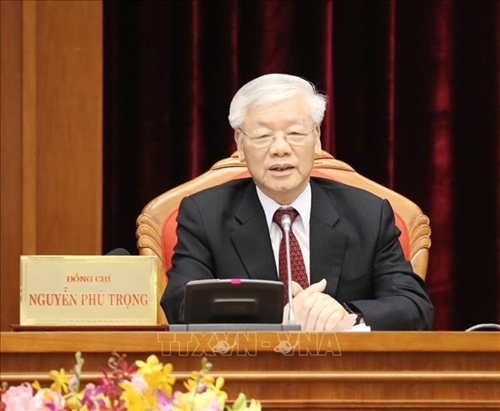The objectives of the Resolution No. 50-NQ/TW include making mechanisms and policies in foreign investment cooperation more competitive, meeting requirements in reforming the growth model and restructuring the economy, protecting the environment, dealing with social issues, and improving the quality, efficiency and competitiveness of the economy.
    |
 |
|
General Secretary of the Communist Party of Vietnam Central Committee Nguyen Phu Trong |
It is expected to bring the Vietnamese business environment and competitiveness to among the top four countries in the ASEAN before 2021 and top three before 2030.
The resolution highlights the significant role of the foreign-invested sector in the economy, while stating that the sector is encouraged to develop and cooperate, and compete equally with other economic sectors. The State respects and protects the rights and interest of investors, ensuring harmony in interests between the State, investors and workers, it states.
Meanwhile, it underscores that projects with advanced and environmentally-friendly technology and high added value will be prioritised, along with the need to diversify partners and investment methods.
Looking back on foreign investment attraction over the past 30 years, the resolution notes many policies and regulations have been issued to build a favourable investment and business environment.
The foreign direct investment (FDI) sector has seen rapid growth with the presence of an increasing number of multinational groups and large-scale projects.
However, the resolution also points out that institutions and policies regarding foreign investment have yet to suit development requirements, adding that the number of small-scale projects with low technology remains high, the sector’s connection with other economic sectors is still loose and the localisation ratio maintains modest.
It gives specific targets in foreign investment attraction, with investment in the 2021-2030 hoped to hit up to 20-50 billion USD each year.
The ratio of businesses using advanced technology and modern management without harming the environment is expected to increase by 50 percent in 2025 and 100 percent in 2030.
The localisation ratio is set to rise from the current 20-25 percent to 40 percent in 2030, while the percentage of trained labourers is expected to reach 80 percent in 2030.
To this end, the resolution mentions several solutions, including the synchronisation of the legal system to deal with existing problems and ensuring equal treatment among foreign and domestic investors.
A security evaluation mechanism will be applied to foreign-invested projects with risks of harming national security, according to the resolution which also encourages the transfer of technology and management methods to Vietnamese firms as well as the use of local labourers.
Projects damaging the environment and failing to effectively use land will be strictly handled, the resolution notes.
Source: VNA